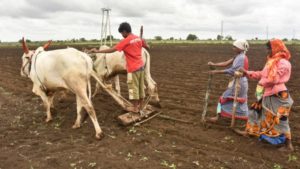Whether it is MSP-based regime or DPPS, both are open-ended, susceptible to ever-increasing subsidy burden, and vulnerable to charge of violation under the WTO

Two recent statements by the top brass give a clue as to how the Modi government intends to deal with pricing of farmers’ produce.
Under the existing system, agencies of the government, such as the Food Corporation of India (FCI), buy agri-produce, such as wheat, rice/paddy, coarse cereals, from farmers at the MSP and distribute at a subsidised price of Rs 1/2/3 per kg through a network of fair price shops, known as the public distribution system (PDS), to meet the needs of India’s poor. The excess of MSP, plus handling, storage and distribution cost over the Rs 1/2/3 per kg, is paid as subsidy.
The government fixes MSP for 22-23 crops grown in Kharif and Rabi seasons. However, purchases by FCI and other State agencies are restricted primarily to rice and wheat. Other important crops are pulses and oilseeds – these are procured by the National Agricultural Cooperative Marketing Federation of India Ltd (NAFED).
The overarching objective of this dispensation is to ensure ‘food security’ for over 800 million people by actually making grains available to them at ‘affordable’ prices. Since 2013, this has been done under a law — the National Food Security Act (NFSA). Giving MSP to the farmer is a complementary objective, but it works under an executive order introduced in the 1960s.
Whereas earlier the State agencies used to procure only the quantity required for the PDS plus a ‘strategic buffer’, now their procurement is open-ended and at ever-increasing MSP.
The system is afflicted by myriad problems — build-up of excessive stocks and wastage; large-scale diversion and misuse; ballooning subsidy bill; and the risk of India violating its commitment under the WTO. This is when only 6% of farmers get MSP benefit covering a select few crops, even as the agencies procure 30% of wheat and rice. There is a clamour for extending MSP coverage to all the 22-23 crops and ‘all’ farmers who have surplus produce to sell. If these demands are granted and that too guaranteed by law (as sought by farmers during their year-long protest), this will be a sure invitation to economic disaster and financial bankruptcy of the central government.
The Modi dispensation is aware of this, and that’s why it has ruled out giving legal guarantee to MSP. Under the DPPS, the government merely compensates farmers for the difference between MSP for select crops and the price realised from selling them in the mandi. Unlike the existing system, wherein the State agencies actually purchase farmers’ produce at MSP, under the proposed system, they need not.
Considering that the government will continue to purchase agri-produce to meet PDS requirements, to that extent, the DPPS will have no relevance. It will substitute only the quantity that the agencies currently buy in excess of what is required for PDS, or on items such as pulses and oilseeds, which they purchase for price support to farmers.
To the extent of substitution of these purchases by deficiency price payments, the government will save money, as it doesn’t have to incur handling and carrying cost (H&CC), besides avoiding the loss from selling grains in the open market under OMSS (Open Market Sale Scheme) at a price lower than MSP.
However, the government will have to make deficiency payments to all farmers on all crops, unlike the existing system wherein MSP is available ‘only to those from whom it buys’. The higher expenditure due to substantially expanded coverage under DPPS will more than offset the savings due to non-purchase. The net result: even here, ballooning subsidy outgo can’t be avoided.
Whether it is MSP-based regime or DPPS, both are open-ended, susceptible to ever-increasing subsidy burden, and vulnerable to charge of violation under the WTO.
What is the way forward?
It is impossible to have a viable State support system that takes care of all farmers and all crops. It should be left entirely to market forces. The government should create an ecosystem in which farmers have multiple options to sell and obtain a remunerative price — this will require resurrection of the three central farm laws in some form. If need be, the government can give direct income support to poor farmers.
This system will be free from the maladies afflicting MSP or DPPS, and India won’t be questioned at the WTO, either. As for the food security objective, the government can purchase from the market the quantity required for the PDS plus the ‘strategic buffer’.
(The writer is a Delhi-based policy analyst)
https://www.deccanherald.com/opinion/in-perspective/all-price-support-systems-are-unviable-1138706.html